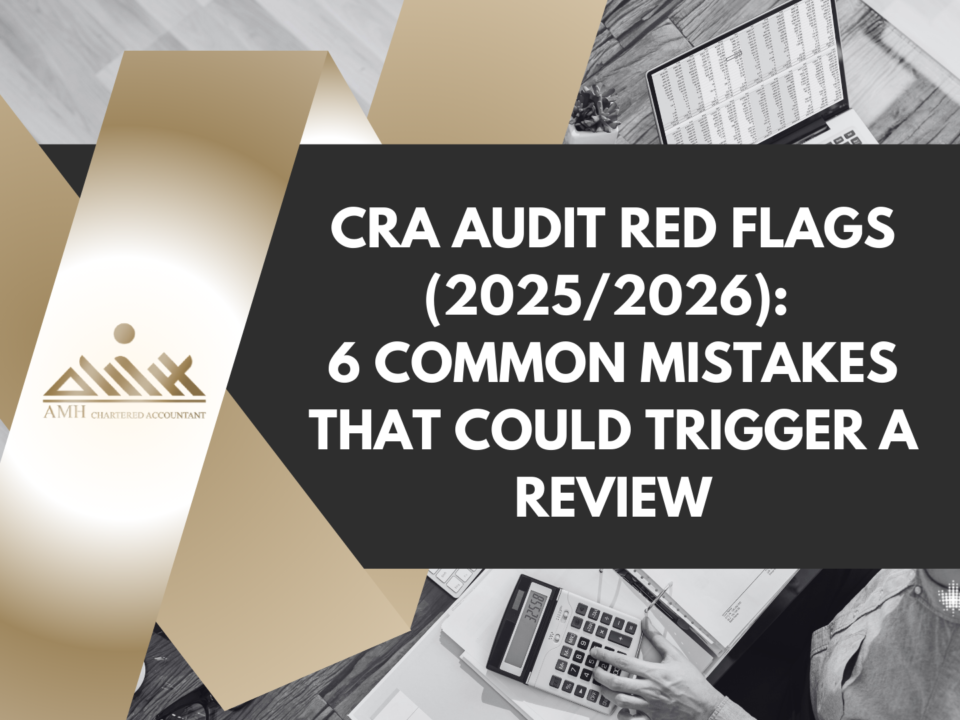
Cash Flow Statements: Why They Matter and How to Use Them
August 30, 2025
Improving Your Invoicing Process to Avoid Missed Payments
September 5, 2025Accrual vs. Cash Accounting: Which System Fits Your Business?
Understanding the difference between accrual and cash accounting is essential for your business’s financial health. Let AMH Chartered Professional Accountant guide you through the two systems and help you determine which is right for your company.
Introduction: The Importance of Choosing the Right Accounting System
When it comes to managing your business finances, the accounting system you choose has a significant impact on your financial reporting, tax filings, and overall business strategy. Among the most common accounting methods are cash basis and accrual basis accounting.
Both methods are used to track and report financial transactions, but they do so in different ways. Whether you’re in Toronto, Milton, Oakville, Hamilton, Kitchener, or Waterloo, understanding these two accounting systems is crucial to selecting the one that best suits your company’s needs.
In this article, we’ll compare accrual vs. cash accounting, outline their advantages and disadvantages, and guide you in choosing the best system for your business.
What is Cash Basis Accounting?
Cash basis accounting is the simplest of the two systems. In this method, you record revenue and expenses when money changes hands—i.e., when payment is received or made.
Key Features of Cash Basis Accounting:
Revenue Recognition: Revenue is recognized when cash is actually received.
Expense Recognition: Expenses are recognized when cash is paid out.
Simplicity: It’s easier to implement and requires less paperwork, making it suitable for small businesses with straightforward financial transactions.
Advantages and Disadvantages of Cash Basis Accounting
Advantages:
Simplicity: Cash basis accounting is easy to understand and implement, making it a great choice for small businesses or startups.
Cash Flow Focus: It gives a clear picture of your business’s cash position since income and expenses are only recorded when money is actually received or paid.
Tax Benefits: If you’re operating a small business, cash basis accounting may help defer some taxes since income is only reported when received, and expenses when paid.
Disadvantages:
Less Accurate Financial Picture: Since revenue and expenses aren’t recorded until cash changes hands, cash basis accounting may not provide an accurate picture of your business’s financial health, especially if you’re working on credit or offering payment terms.
Ineligible for Some Businesses: Larger companies or businesses with inventory may not be allowed to use cash basis accounting under Generally Accepted Accounting Principles (GAAP).
Potential for Misleading Financial Statements: Businesses that rely on credit transactions may mislead owners or investors about actual performance.
What is Accrual Basis Accounting?
Accrual basis accounting is a more complex system that records revenue and expenses when they are incurred, not when cash changes hands. This method is generally used by larger businesses or those seeking to have more precise financial statements.
Key Features of Accrual Basis Accounting:
Revenue Recognition: Revenue is recognized when it is earned, even if payment has not been received (e.g., when a service is performed or goods are delivered).
Expense Recognition: Expenses are recorded when incurred, even if payment is not made at that time.
Matching Principle: This system ensures that income and expenses are recorded in the period they occur, providing a more accurate view of profitability.
Advantages and Disadvantages of Accrual Basis Accounting
Advantages:
More Accurate Financial Reporting: Accrual accounting provides a clearer and more accurate picture of your business’s financial health since it includes all earned revenue and incurred expenses, regardless of when payment occurs.
Better for Growing Businesses: As your business grows, accrual accounting becomes more useful, especially if you deal with large-scale contracts, inventory, or long-term projects.
Improved Planning and Forecasting: Since all income and expenses are accounted for, this method allows for better financial planning and forecasting.
Disadvantages:
Complexity: Accrual accounting is more complex to implement and maintain, requiring additional accounting expertise and software.
Cash Flow Management Challenges: Since revenue and expenses are recorded before cash changes hands, it can create challenges in understanding your actual cash flow.
Requires More Detailed Records: You need to track all receivables and payables, which can be time-consuming and increase administrative costs.
Accrual vs. Cash Accounting: Key Differences
| Aspect | Cash Basis Accounting | Accrual Basis Accounting |
|---|---|---|
| Revenue Recognition | When cash is received | When earned (regardless of cash received) |
| Expense Recognition | When cash is paid | When incurred (regardless of when payment is made) |
| Complexity | Simple and easy to implement | More complex, requires more records and expertise |
| Accuracy | Provides a limited view of financial health | Provides a more accurate and comprehensive view |
| Suitability | Small businesses with simple transactions | Larger businesses or those with inventory or long-term contracts |
| Tax Implications | May delay taxes as income is reported when received | Taxable income is reported even before cash is received |
How to Decide Which Accounting System is Right for Your Business
The choice between cash and accrual accounting ultimately depends on your business’s size, complexity, and needs. Here’s how to decide which system fits:
Consider Your Business Size and Complexity:
Small businesses or startups with simple operations and fewer transactions may benefit from cash basis accounting because it is easier to implement and offers straightforward cash flow management.
Larger businesses with inventory, long-term contracts, or multiple departments will likely benefit from accrual accounting, as it provides a more accurate and detailed financial picture.
Evaluate Your Industry:
Some industries, particularly those with long sales cycles or those that rely on credit, may require accrual accounting. For instance:
Retail businesses may prefer cash accounting if they operate with minimal credit.
Construction, consulting, or service-based companies often use accrual accounting because they work on long-term contracts and deal with receivables.
Consider Your Tax Filing Needs:
If your business grosses under a certain threshold, the CRA may allow you to use cash basis accounting for tax purposes. However, if you anticipate significant growth or require more detailed financial reporting, accrual accounting may be a better fit for the future.
The Impact of Business Size and Complexity on Your Accounting System
Smaller businesses with straightforward financial operations typically find cash basis accounting a better option, as it allows for simpler record-keeping and a direct reflection of cash flow. As businesses scale and their operations become more complex—dealing with inventory, long-term projects, or significant credit transactions—accrual accounting becomes more relevant.
AMH Chartered Professional Accountant can help you assess the needs of your business and ensure that you choose the right accounting system, aligned with your growth trajectory and industry standards.
Industry Considerations: Which System Works Best for Your Sector?
Different industries have varying requirements for financial tracking, which impacts the choice of accounting method. Here’s a quick overview of which method is often preferred by specific sectors:
Retail: Smaller businesses in retail may benefit from cash basis accounting to keep things simple. Larger retailers may adopt accrual accounting to track inventory and accounts receivable.
Construction and Project-Based Businesses: These businesses usually require accrual accounting because projects span over multiple months or years, and the company needs to recognize revenue and expenses as they occur.
Service-Based Industries: Accrual accounting is ideal for service-based industries like law, consulting, or marketing agencies, where projects take time and payments are often spread out over periods.
Tech and Software: Companies in tech often use accrual accounting to handle subscription-based revenue and long-term contracts.
The Role of AMH Chartered Professional Accountant in Your Accounting System Selection
Choosing the right accounting method is just the beginning. At AMH Chartered Professional Accountant, we assist businesses in selecting and implementing the accounting system that suits their needs. Our services include:
Customized Advice on cash vs. accrual accounting
Implementation Support for both systems
Ongoing Accounting Services to manage your system effectively
We ensure that your accounting system is scalable and positioned for growth as your business evolves.
Transitioning from Cash to Accrual Accounting: A Step-by-Step Guide
If your business is currently using cash basis accounting and is growing, transitioning to accrual accounting may be necessary. Here’s how to transition:
Assess Your Financial Records: Ensure your books are up-to-date before making the switch.
Set Up Accrual Accounts: Implement new accounts for receivables and payables, as well as deferred revenue and expenses.
Transition Gradually: You can implement accrual accounting for new transactions while gradually transitioning existing accounts.
Seek Professional Help: Work with AMH Chartered Professional Accountant for seamless implementation.
How AMH Can Help You Implement the Right Accounting System
At AMH Chartered Professional Accountant, we provide expert consulting to help you select, implement, and maintain the right accounting system. Whether you choose cash basis accounting for its simplicity or accrual accounting for its accuracy, we’ll ensure that your accounting system meets your current and future business needs.
Final Thoughts: Choosing the Right Accounting System for Business Success
The choice between cash vs. accrual accounting is a critical decision that will impact your financial management, tax filings, and overall business operations. By understanding the advantages and disadvantages of both systems and considering the unique needs of your business, you can make an informed decision that supports your long-term success.
FAQs
Can small businesses use accrual accounting?
Yes, small businesses can use accrual accounting, but it may be more complex and may require additional resources.
How does cash basis accounting affect my taxes?
Cash basis accounting may offer some tax advantages, as income is reported when received, and expenses when paid.
What should I do if I need to switch from cash to accrual accounting?
Consider consulting with an accountant, like AMH Chartered Professional Accountant, to ensure the transition is smooth and that your financial records are updated correctly.
How do I know which method is best for my business?
Consulting with an expert accountant can help you assess your needs and choose the method that aligns best with your business operations.




